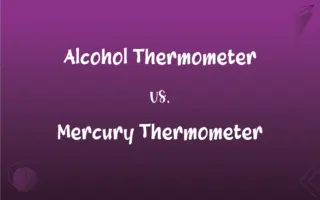Depolarization vs. Repolarization: What's the Difference?
Edited by Aimie Carlson || By Harlon Moss || Updated on October 27, 2023
Depolarization is the process where a cell's membrane potential becomes more positive, while repolarization is its return to a negative potential.

Key Differences
Depolarization is a cellular event that signifies an increase in membrane potential, making it less negative. In contrast, repolarization is the process by which the membrane potential is restored back to its resting negative value.
During an action potential in neurons, depolarization is the phase where sodium ions rush into the cell. Repolarization, on the other hand, is the phase where potassium ions exit the cell.
Depolarization is generally considered the "on" state for a cell, allowing for the transmission of nerve impulses. Repolarization is viewed as the "reset" state, preparing the cell for the next potential action.
In the context of the heart, depolarization leads to the contraction of cardiac muscle cells. Repolarization corresponds to their relaxation.
It is critical for cells to undergo both depolarization and repolarization effectively to maintain proper cell function. If either process is compromised, it could lead to disorders or dysfunctions in the system.
ADVERTISEMENT
Comparison Chart
Membrane Potential
Becomes more positive
Returns to negative
Ionic Movement
Sodium ions enter the cell
Potassium ions leave the cell
Cell State
"On" state for transmission
"Reset" state for next potential action
Heart Muscle Cells
Leads to contraction
Corresponds to relaxation
Role in Action Potential
Initial phase leading to nerve impulse transmission
Concluding phase to reset the cell
ADVERTISEMENT
Depolarization and Repolarization Definitions
Depolarization
Depolarization is the shift in a cell's membrane potential to a less negative state.
During the action potential, depolarization causes the neuron to fire.
Repolarization
Repolarization results from the efflux of potassium ions from a cell.
During repolarization, potassium channels open, allowing potassium ions to leave the cell.
Depolarization
Depolarization initiates the action potential in neurons.
Depolarization is the spark that begins the nerve impulse transmission.
Repolarization
Repolarization is the restoration of a cell's negative membrane potential.
After the action potential peaks, repolarization starts to return the cell to its resting state.
Depolarization
Depolarization signifies cellular activation. When depolarization occurs,
The cell is activated and ready for action.
Repolarization
Repolarization ensures that a cell is ready for another potential action.
The neuron must undergo repolarization before it can fire another action potential.
Depolarization
Depolarization represents the influx of sodium ions into a cell.
The rapid depolarization phase is due to the opening of sodium channels.
Repolarization
Repolarization resets the cell after an action potential.
Once repolarization is complete, the cell returns to its baseline state.
Depolarization
Depolarization is the precursor to the contraction of heart muscle cells.
In the heart, depolarization sets the stage for a heartbeat.
Repolarization
Repolarization leads to the relaxation of heart muscle cells.
After the heart contracts, repolarization helps the muscles relax.
Depolarization
To partially or completely eliminate or counteract the polarization of.
Repolarization
The restoration of a polarized state across a membrane, as in a muscle fiber following contraction.
Repolarization
The act of repolarizing.
FAQs
Is depolarization the same in neurons and heart cells?
The basic mechanism is similar, but the effects differ: in neurons, it leads to nerve impulse transmission, while in heart cells, it leads to contraction.
Which ions are key to repolarization?
Potassium ions are essential for repolarization as they leave the cell.
What is depolarization?
Depolarization is the process where a cell's membrane potential becomes less negative or more positive.
What would happen if repolarization did not occur?
Without repolarization, a cell would remain activated and unable to properly reset, disrupting normal cellular functions.
Can a cell fire another action potential during repolarization?
Typically, a cell cannot initiate another action potential during the early part of repolarization, known as the refractory period.
What is repolarization?
Repolarization is the process where a cell's membrane potential returns to its resting negative state.
What ions are primarily involved in depolarization?
Sodium ions primarily drive depolarization by entering the cell.
What channels open during depolarization?
Sodium channels open during depolarization.
Which channels play a key role in repolarization?
Potassium channels are vital for repolarization.
Can abnormalities in depolarization and repolarization cause health issues?
Yes, abnormalities in these processes can lead to disorders in the nervous and cardiovascular systems.
What happens after depolarization in an action potential?
After depolarization, repolarization begins to reset the cell to its resting state.
Is depolarization always followed by repolarization?
In typical cellular events like action potentials, depolarization is followed by repolarization.
What's the significance of repolarization in the heart?
Repolarization in the heart corresponds to the relaxation of cardiac muscle cells after contraction.
Is the refractory period associated more with depolarization or repolarization?
The refractory period is more associated with repolarization, where the cell is resistant to firing another action potential.
Why is the balance between depolarization and repolarization important?
This balance ensures proper cell function, allowing for controlled activation and reset of cells.
Can medications influence depolarization and repolarization?
Yes, certain medications can influence these processes, especially drugs targeting the heart and nervous system.
Which process, depolarization or repolarization, is longer during an action potential?
The duration can vary based on the cell type, but in many neurons, depolarization is rapid, while repolarization is slightly longer.
Do cells always depolarize before repolarizing?
In the context of action potentials, yes, depolarization typically precedes repolarization.
How does depolarization affect neurotransmitter release?
Depolarization of neuron terminals can trigger the release of neurotransmitters into the synapse.
Do all cells in the body undergo depolarization and repolarization?
While many cells can undergo these processes, they are most commonly discussed in the context of neurons and muscle cells.
About Author
Written by
Harlon MossHarlon is a seasoned quality moderator and accomplished content writer for Difference Wiki. An alumnus of the prestigious University of California, he earned his degree in Computer Science. Leveraging his academic background, Harlon brings a meticulous and informed perspective to his work, ensuring content accuracy and excellence.
Edited by
Aimie CarlsonAimie Carlson, holding a master's degree in English literature, is a fervent English language enthusiast. She lends her writing talents to Difference Wiki, a prominent website that specializes in comparisons, offering readers insightful analyses that both captivate and inform.































































